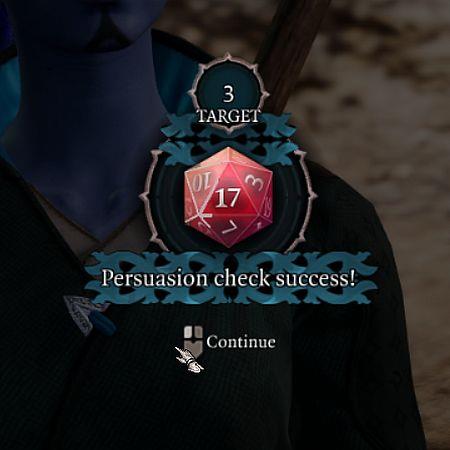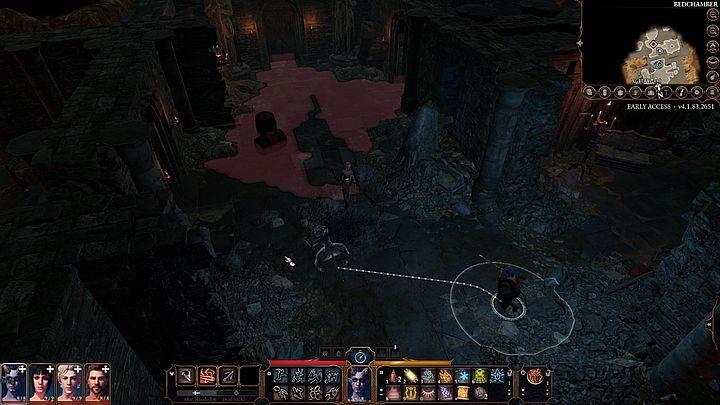In the sprawling world of Baldur’s Gate 3, players often find themselves at a crossroads: engage in thrilling battles or sidestep them entirely. The game offers a rich tapestry of choices, allowing cunning adventurers to utilize stealth, diplomacy, and clever tactics to bypass confrontations. Whether you’re negotiating your way out of a bandit ambush or sneaking past a horde of enemies, the ability to avoid fights can be just as rewarding as the thrill of combat. This guide explores the myriad strategies available for those who prefer a more pacifist approach, ensuring that every encounter can be navigated with finesse and creativity.
During exploration, you will encounter a number of adversaries. Meeting some of them ends with mandatory combat. However, there are encounters where the ability to avoid combat appears. Of course, attempts to avoid combat may backfire – luck is one of the factors here. The game offers two such methods.
Skill roll
In Baldur’s Gate 3, the Skill Roll mechanic plays a crucial role in avoiding combat through dialogue. When encountering potential foes, players may engage in conversations that allow them to utilize specific character skills, such as Persuasion or Intimidation. These dialogue options are indicated by square brackets, showing which ability will be tested. Once a choice is made, a dice roll determines the success of the attempt; players must meet or exceed a target number to avoid conflict. If the roll fails, the opportunity to reroll is not available, although players can reload their last save to try again. This mechanic emphasizes the importance of character development and strategic decision-making in navigating encounters without resorting to violence.
This option is available if the fight is preceded by a conversation with a potential opponent. A skill roll is a test based on specific skills possessed by a given character. The dialogue paths that use this mechanic have a square parenthesis that tells you what character’s ability will be tested.
Once a particular option is selected, a dice throw window will be shown. You can see on it what value you need to achieve for a character to pass their test. If the dice lands on a wrong side, the attempt will fail. You cannot do a second throw. You can also load your latest save and try again.
Note: for more information on skill rolls, please visit a dedicated page of the guide.
Sneaking
Sneaking in Baldur’s Gate 3 is a valuable tactic that allows players to bypass combat or gain the upper hand against enemies. By utilizing the “hide” action, characters can move silently, evading detection from foes unless they enter the opponent’s viewcone, which is visibly marked in red. The effectiveness of sneaking is influenced by environmental factors like light and shadows; staying in darker areas increases the chances of remaining unnoticed. Additionally, successful sneaking can lead to surprise attacks that do not consume action points, enabling players to strike first and potentially reshape the course of an encounter without engaging in full combat.
The second option involves stealth. In this case, you must select a specific character and select the “hide” option found on the action bar. The character then begins to move silently, and until the opponent notices him, he is safe.
Each opponent has a specific viewcone, which is marked in red. If you find yourself in it, you will automatically be detected and the fight begins.
The range of vision is affected by light. If a character is in the shadows, the enemies may not be able to notice him. Darkness affects the range of vision of the character.
What are the best classes for avoiding fights in Baldur’s Gate 3
In Baldur’s Gate 3, certain classes excel at avoiding fights through their unique abilities and skills. Here are the best classes for players looking to navigate the game with minimal combat:
Best Classes for Avoiding Fights
-
Bard
- Charisma Focus: Bards rely heavily on Charisma, making them adept at persuasion, deception, and performance checks. Their ability to charm and negotiate can often allow players to bypass confrontations entirely.
- Skills: With access to skills like Deception and Persuasion, Bards can diffuse tense situations and avoid combat through dialogue.
-
Sorcerer
- Spellcasting: Sorcerers also benefit from high Charisma, which enhances their spellcasting abilities. They can use spells creatively to manipulate situations or intimidate foes.
- Illithid Powers: Certain abilities allow Sorcerers to bypass fights altogether, making them effective in avoiding combat scenarios.
-
Rogue
- Stealth and Deception: Rogues are masters of stealth, allowing them to sneak past enemies undetected. Their high Dexterity also aids in avoiding traps and ambushes.
- Skill Monkey Role: With a wide range of skills, including Sleight of Hand and Stealth, Rogues can navigate conflicts without engaging directly in combat.
-
Ranger (Beast Master Subclass)
- Animal Companions: Rangers can utilize animal companions for distractions or scouting ahead, enabling them to avoid fights by gathering intelligence on enemy positions.
- Stealth Abilities: Rangers also have access to stealth skills that allow them to bypass threats unnoticed.
-
Paladin
- Intimidation and Diplomacy: While typically seen as frontline fighters, Paladins can leverage their Charisma for intimidation checks, potentially scaring off foes before combat begins.
- Divine Sense: This ability helps in assessing threats, allowing players to avoid unnecessary encounters.
Conclusion
These classes not only provide combat capabilities but also offer unique approaches to conflict resolution through dialogue and stealth. By investing in Charisma-based skills and utilizing stealth mechanics, players can navigate the challenges of Baldur’s Gate 3 while minimizing direct confrontations.
Which classes have the best diplomacy skills
In Baldur’s Gate 3, certain classes are particularly well-suited for diplomacy, leveraging their skills to navigate social interactions and avoid conflict. Here are the best classes for players who want to excel in diplomatic scenarios:
Best Classes for Diplomacy
-
Bard
- Charisma-Based Skills: Bards use Charisma as their primary ability score, making them exceptional at persuasion and deception.
- Expertise: They can gain Expertise in skills like Persuasion and Insight, significantly boosting their effectiveness in social situations.
- Spells: Bards have access to a wide range of spells that enhance their diplomatic efforts, including charm effects and illusions.
-
Sorcerer
- High Charisma: Like Bards, Sorcerers rely on Charisma, allowing them to excel in negotiations and social interactions.
- Mind-Altering Magic: They can cast spells that influence or manipulate others, providing unique advantages in diplomatic encounters.
-
Rogue (Mastermind Subclass)
- Social Manipulation: The Mastermind Rogue specializes in social interactions, gaining features that enhance their ability to deceive and manipulate.
- Expertise in Key Skills: Rogues can select skills like Persuasion and Insight for Expertise, making them adept negotiators.
-
Paladin
- Divine Authority: Paladins can leverage their strong presence and moral authority to persuade others.
- Charisma Skills: They also benefit from high Charisma, allowing them to excel in intimidation and persuasion.
-
Warlock
- Eldritch Invocations: Warlocks can choose invocations that enhance their social skills or provide unique ways to influence others.
- Pact Magic: Their spells can also be used creatively to manipulate conversations or situations.
Conclusion
These classes not only provide combat capabilities but also offer substantial advantages in diplomacy. Players who focus on Charisma-based skills and utilize their class features effectively can navigate the rich narrative landscape of Baldur’s Gate 3 with finesse, often avoiding conflict through clever negotiation and charm.


